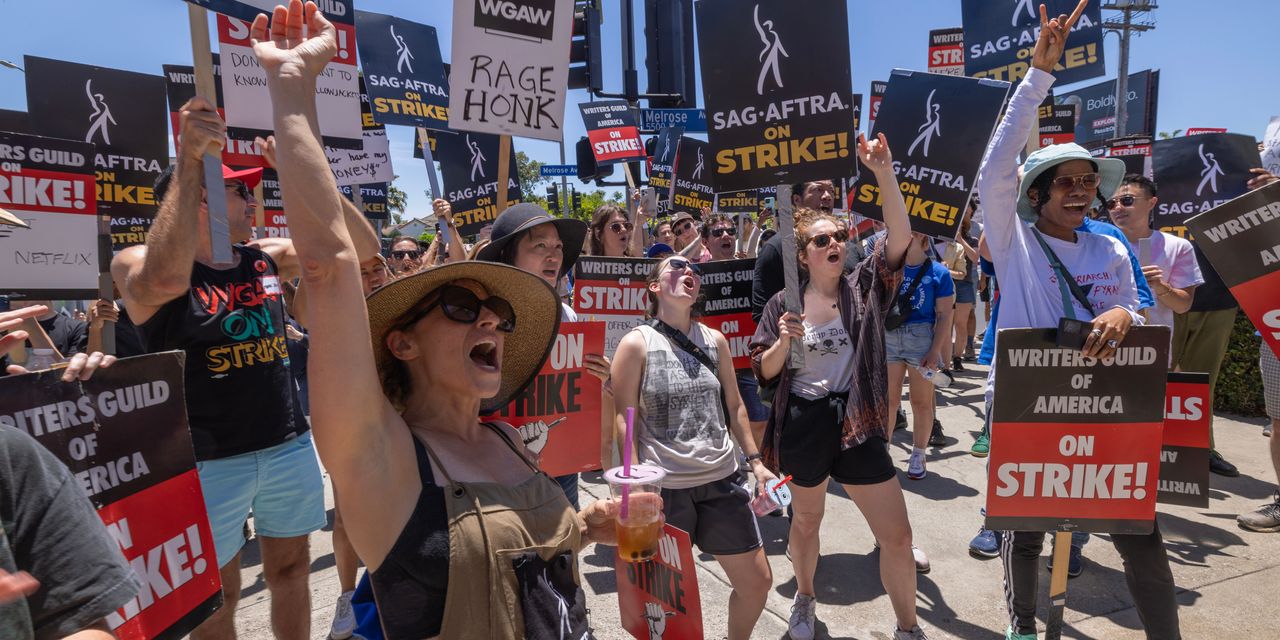Keisha Zollar has been in the film and television industry for almost two decades now. She was most recently seen on Stephen Colbert’s animated satirical news show, “Tooning Out the News,” as a recurring cast member.
She and her husband, Andrew Kimler, who is also an actor, writer and comedian, say it’s hard to make a living in show business.
“I barely qualified for SAG insurance,” Zollar said, referring to the Screen Actors Guild. Fortunately, she said, she also qualifies for insurance from the Writers Guild of America (WGA). “If it was just acting, I don’t think we could survive.”
“There is a huge variation in how much working actors earn, to say nothing of the million-dollar salaries Hollywood’s A-list actors pull in for even one movie. ”
The couple said they support the current actors and writers’ strikes. Members of SAG-AFTRA — the union representing more than 170,000 actors and other performers — went on strike on July 14, while 11,500 WGA members have been on strike for fair pay and treatment since May 2.
The unions are pushing for the fair use of artificial intelligence, stronger regulations for self-taped auditions, better pay, more transparent and generous royalty payments and many other issues related to working conditions.
It’s the first time since the 1960s that both unions have gone on strike at the same time. The strikes could last a while; the WGA’s previous strike went from November 2007 to February 2008. The actors’ strike in the 1980s lasted for more than 70 days.
What kind of a living do actors earn?
The average hourly pay for an actor in the U.S. was $36.06 in May 2022 — but the median hourly pay was $17.94, according to the most recent data from the Bureau of Labor Statistics. (The median wage means that 50% of U.S. actors earn an hourly wage at or below $17.94. Many actors also go long stretches between jobs.)
The difference between average and median wages is due, in part, to the huge variation in how much working actors earn, to say nothing of the million-dollar salaries Hollywood’s A-list actors pull in for even one movie. These differences effectively reflect a class gap within the industry, union members and advocates say.
Actors must make a minimum of $26,470 in eligible earnings to qualify for health insurance from SAG-AFTRA in 2023, according to the union’s website. But many actors don’t make that much, Zollar said. Meanwhile, the annual minimum income to be eligible for WGA health insurance in 2023 is $41,773.
While some members of the actors and writers’ guilds work other jobs such as teaching or waitressing to supplement their income, industry practices can make it hard for them to manage their schedules, experts said. Actors are often expected to keep their schedule open for a given job — even before production makes a final decision on casting, they say.
“This is a major network and a major show — union work,” Kimler said. “I haven’t done that show since because of that. That’s not fair. That’s not a sustainable way to live.”
Leveraging skills during a strike
Because of the current strikes, many TV series have been forced to go on hiatus, and movie productions have gone dark. Members of the labor unions are not allowed to promote any of their finished shows, including attending events or posting about their shows on social media.
With work opportunities dwindling — which can be especially hard for those who are just starting out in the industry — Zollar and Kimler said there are things that artists can do during the strike that can also help prepare them for times when they are between acting jobs.
“‘If it was just acting, I don’t think we could survive.’”
Kate Burton has been acting — on stage, on TV and on the big screen — since the 1980s. Now a professor of theater practice in acting at the University of Southern California, she has been preparing graduates by talking to them about during the strike.
Actors can spend their downtime getting headshots, making sure they have an up-to-date résumé and practicing readings for future auditions, in addition to lining up other side hustles and non-union work — including some SAG-approved independent films — to support themselves financially while waiting for the strike to end.
“This will be work that will support them in the future,” Burton told MarketWatch. “We are all doing that.”
The talent, the grit — and the hustle
For most actors, finding work is their day job, and performing is their break, Kimler said. Actors are often juggling responsibilities, including waiting tables, while they record and submit self-taped auditions. Kimler and Zollar sometimes write, sometimes act, and sometimes they take on teaching jobs to supplement their incomes.
For anyone who wants to make a living as an artist, preparation is everything. “Understand you will have lean times and you will have fruitful times,” Zollar said. “And you never know when, or why, or how a strike could happen.”
There is also still opportunity in live theater. Roles in theatrical productions are overseen and contracted by the Actors’ Equity Association, which has over 50,000 members and whose members are not on strike.
“‘You can still publish stories. You can still do open mics. You can still put on plays, you can still do readings. You can still do things that tickle the part of you that reminds you you’re an artist.’”
It could also be a time to try out something different, such as writing a graphic novel instead of writing for TV, Kimler said. He recommends that people write as much as possible and also get to know as many other writers as possible.
“You are going to just learn a lot from talking to other writers, and that’s where your greatest opportunities lie,” Kimler said.
Kimler said he tells his students that, in order to be able to create a film or television show, they have to fall in love with the “process” — and not the end result. Winning an Oscar, he said, cannot be the only goal.
Ultimately, a pause on production does not have to mean a pause on creativity.
“No one has to take that away from you,” Zollar said. “You can still publish stories. You can still do open mics. You can still put on plays, you can still do readings. You can still do things that tickle the part of you that reminds you you’re an artist.”
“I believe in the merits, the talents, the grit and the hustle of writers,” she said.
“I hope the studios can see our value,” Zollar added.
Read the full article here











